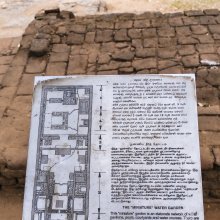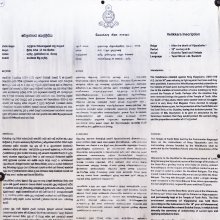Ekaka, Eka-ka: 14 definitions
Introduction:
Ekaka means something in Hinduism, Sanskrit, Buddhism, Pali, Hindi. If you want to know the exact meaning, history, etymology or English translation of this term then check out the descriptions on this page. Add your comment or reference to a book if you want to contribute to this summary article.
Alternative spellings of this word include Ekak.
Images (photo gallery)
In Hinduism
Natyashastra (theatrics and dramaturgy)
Source: Wisdom Library: Nāṭya-śāstra1) Ekaka (एकक) refers to one of the three limbs of vastu (‘thing’) mentioned in the Nāṭyaśāstra chapter 31. Accordingly, “the vivadha and the ekaka are generally used in the madraka song, in each half vastu of the prakarī, and in each quarter of the rovindaka. But in the rovindaka, uttara, ullopyaka, pāṇikā, bahirgītas and lāsya, the vṛtta is used”.
2) Ekaka (एकक) refers to one of the three limbs (aṅga) belonging to all types of dhruvā (“song”) defined in the Nāṭyaśāstra chapter 32.9-16. Accordingly, “the vṛtta class of limbs will apply to the superior characters, and the vivadha to the middling ones, and the ekaka to the inferior characters”.

Natyashastra (नाट्यशास्त्र, nāṭyaśāstra) refers to both the ancient Indian tradition (shastra) of performing arts, (natya—theatrics, drama, dance, music), as well as the name of a Sanskrit work dealing with these subjects. It also teaches the rules for composing Dramatic plays (nataka), construction and performance of Theater, and Poetic works (kavya).
Languages of India and abroad
Pali-English dictionary
Source: BuddhaSasana: Concise Pali-English Dictionaryekaka : (adj.) single; solitary.
Source: Sutta: The Pali Text Society's Pali-English DictionaryEkaka, (adj.) (eka + ka) single, alone, solitary Vin.II, 212; J.I, 255; II, 234; IV, 2.—f. ekikā Vin.IV, 229; J.I, 307; III, 139. (Page 160)

Pali is the language of the Tipiṭaka, which is the sacred canon of Theravāda Buddhism and contains much of the Buddha’s speech. Closeley related to Sanskrit, both languages are used interchangeably between religions.
Sanskrit dictionary
Source: DDSA: The practical Sanskrit-English dictionaryEkaka (एकक).—a.
1) Single, alone, solitary, without a coadjutor; अयं हि शिशुरेकको (ayaṃ hi śiśurekako) Uttararāmacarita 5.5, Daśakumāracarita 111.
2) Same, identical.
-śatam one percent.
--- OR ---
Ekaka (एकक).—The number twentyone; Y.3.224.
Derivable forms: ekakam (एककम्).
Ekaka is a Sanskrit compound consisting of the terms eka and ka (क).
Source: Cologne Digital Sanskrit Dictionaries: Shabda-Sagara Sanskrit-English DictionaryEkaka (एकक).—mfn.
(-kaḥ-kā-kaṃ) Alone, solitary. E. eka one, &c. kan aff.
Source: Cologne Digital Sanskrit Dictionaries: Benfey Sanskrit-English DictionaryEkaka (एकक).—[eka + ka], adj. 1. Solitary, [Pañcatantra] iii. [distich] 51. 2. Same, [Mānavadharmaśāstra] 9, 38.
Source: Cologne Digital Sanskrit Dictionaries: Cappeller Sanskrit-English DictionaryEkaka (एकक).—([feminine] ekakā & ekikā) sole, single.
Source: Cologne Digital Sanskrit Dictionaries: Monier-Williams Sanskrit-English DictionaryEkaka (एकक):—[from eka] mf(ā, ikā)n. single, alone, solitary, [Ṛg-veda x, 59, 9; Atharva-veda xx, 132, 1.]
Source: Cologne Digital Sanskrit Dictionaries: Yates Sanskrit-English DictionaryEkaka (एकक):—[(kaḥ-kā-kaṃ) a.] Alone.
Source: DDSA: Paia-sadda-mahannavo; a comprehensive Prakrit Hindi dictionary (S)Ekaka (एकक) in the Sanskrit language is related to the Prakrit word: Ekka.
[Sanskrit to German]
Sanskrit, also spelled संस्कृतम् (saṃskṛtam), is an ancient language of India commonly seen as the grandmother of the Indo-European language family (even English!). Closely allied with Prakrit and Pali, Sanskrit is more exhaustive in both grammar and terms and has the most extensive collection of literature in the world, greatly surpassing its sister-languages Greek and Latin.
Hindi dictionary
Source: DDSA: A practical Hindi-English dictionaryEkaka (एकक) [Also spelled ekak]:—(nm) a unit.
...
Kannada-English dictionary
Source: Alar: Kannada-English corpusĒkaka (ಏಕಕ):—
1) [adjective] single; of unit number; being alone; undivided.
2) [adjective] being one and the same.
Kannada is a Dravidian language (as opposed to the Indo-European language family) mainly spoken in the southwestern region of India.
See also (Relevant definitions)
Starts with (+20): Ekakaksha, Ekakala, Ekakalabhojana, Ekakalahomalopaprayashcitta, Ekakalam, Ekakali, Ekakalika, Ekakalikam, Ekakalikate, Ekakalin, Ekakalina, Ekakalpa, Ekakam, Ekakamdhe, Ekakami, Ekakana, Ekakanajivi, Ekakanda, Ekakandalasum, Ekakandyalasuna.
Ends with: Bekaka, Jeekaka, Kekaka.
Full-text: Ekka, Ekakashata, Ekika, Ekaeka, Ekala, Numbar, Ekak, Ekakapala, Vivadha, Nirapeksha, Nirapeksh, Rovindaka, Vritta, Vaktrapani, Dhruva.
Relevant text
Search found 8 books and stories containing Ekaka, Eka-ka, Ēkaka; (plurals include: Ekakas, kas, Ēkakas). You can also click to the full overview containing English textual excerpts. Below are direct links for the most relevant articles:
The Great Chronicle of Buddhas (by Ven. Mingun Sayadaw)
Introduction to the Etadagga-Vagga of the Ekaka-Nipata < [Chapter 43 - Forty-one Arahat-Mahatheras and their Respective Etadagga titles]
Part 6 - Contemplation on Rare Appearance of a Buddha < [Chapter 2 - Rare Appearance of a Buddha]
Biography (1): Tapussa and Bhallika < [Chapter 45a - The Life Stories of Male Lay Disciples]
Bhakti-rasamrta-sindhu (by Śrīla Rūpa Gosvāmī)
Verse 4.3.21 < [Part 3 - Chivalry (vīrya-rasa)]
Guide to Tipitaka (by U Ko Lay)
Chapter VII - Anguttara Nikaya
Part 10 - Jataka Pali < [Chapter VIII - Khuddaka Nikaya]
Part 4 - Itivuttaka Pali < [Chapter VIII - Khuddaka Nikaya]
Philosophy of language in the Five Nikayas (by K.T.S. Sarao)
2.5(e). Aṅguttara Nikāya (Numerical Discourses of the Buddha) < [Chapter 1 - Introduction]
Rig Veda (translation and commentary) (by H. H. Wilson)
Rig Veda 10.59.9 < [Sukta 59]
Vakyapadiya of Bhartrihari (by K. A. Subramania Iyer)
Verse 3.14.1 < [Book 3 - Pada-kāṇḍa (14): Vṛtti-samuddeśa (On Ccomplex Formation)]

